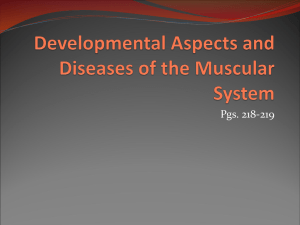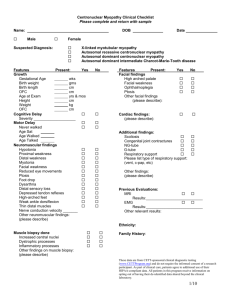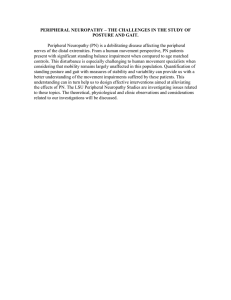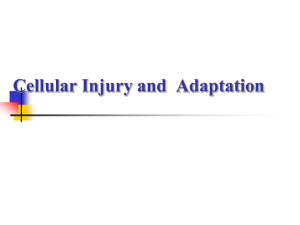Signs of Neuromuscular Disorders that MUST NOT be
advertisement
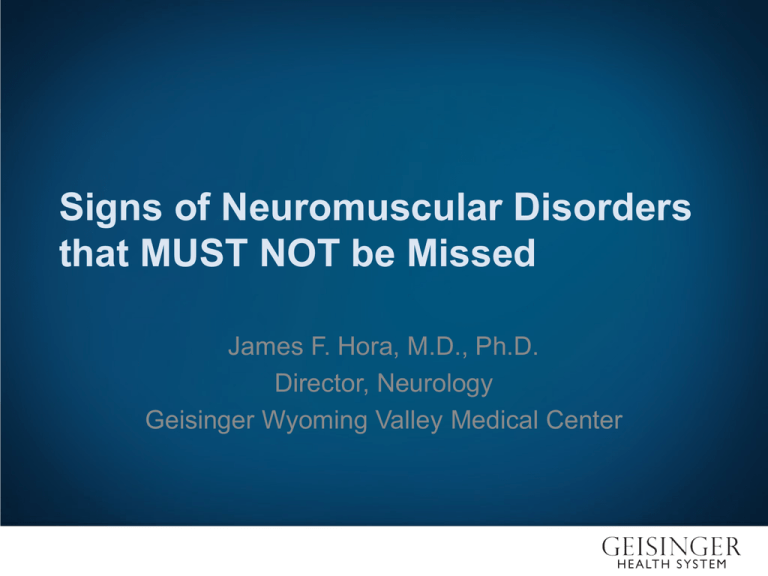
Signs of Neuromuscular Disorders that MUST NOT be Missed James F. Hora, M.D., Ph.D. Director, Neurology Geisinger Wyoming Valley Medical Center NEUROMUSCULAR DISEASE RUSSELL N. DeJONG, M.D. (1906-1990) CLINICAL NEUROMUSCULAR MEDICINE “Not only is neurology closely linked to internal medicine, and not only do serious nervous system manifestations and complications accompany systemic disease, but these nervous system manifestations may be the first evidence of disease elsewhere in the body.” • Russell N. DeJong, M.D. “ YET TODAY I CONSIDER MYSELF THE LUCKIEST MAN ON THE FACE OF THE EARTH.” July 4, 1939 MOTOR NEURON DISEASE Slowly Progressive Motor Symptoms Usually Distal in Hands or Legs Atrophy Fasciculations: multifocal spontaneous muscle fiber twitches that do not move the limb. Cramping Bulbar Symptoms: dysarthria, dysphagia, drooling Amyotrophic Lateral Sclerosis: must have clinical signs of both UMN and LMN dysfunction. MND “mimics.” AMYOTROPHIC LATERAL SCLEROSIS UMN SIGNS: spasticity hyperactive reflexes Babinski’s sign (dementia) (pseudobulbar affect) LMN SIGNS: fasciculations atrophy cramping ALS MIMICS Syringomyelia Adult Onset Spinal Muscular Atrophy (SMA IV) Progressive Muscular Atrophy Juvenile Segmental Spinal Muscular Atrophy (Hirayama Disease) Scapuloperoneal Spinal Muscular Atrophy (Davidenkow Disease) X-Linked Spinobulbar Muscular Atrophy (Kennedy’s Disease) Multifocal Motor Neuropathy with Conduction Block Chronic Inflammatory Demyelinating Polyradiculoneuropathy Neuralgic Amyotrophy (Parsonage-Turner Syndrome) Inclusion Body Myositis Cramp Fasciculation Syndrome Benign Fasciculations MOTOR NEURON DISEASE MOTOR NEURON DISEASE PROTOTYPIC NEUROPATHY CHRONIC (8 WEEKS to YEARS) SYMMETRIC and LENGTH DEPENDENT SENSORY-PREDOMINANT SYMPTOMS PARESTHESIAS +/- NUMBNESS NO or MINIMAL WEAKNESS SENSORY DEFINITIONS NEGATIVE SYMPTOMS Numb: lost sensation Balance • Unsteadiness • Gait dysfunction • Frequent Falls POSITIVE SYMPTOMS Paresthesias: abnormal sensations in the absence of stimulation (burning, prickly, tingling, cold,“asleep”, etc.). Dysesthesias: abnormal sensation in response to stimulation. Allodynia: pain following stimulation that is not painful. Hyperalgesia: increased pain evoked by a noxious stimulus. PROTOTYPIC NEUROPATHY Distal Sensory Deficits to Temperature, Vibration, Pin and/or Position Sense. Minimal Atrophy and Weakness of Distal Muscles. Hypoactive or Reduced Ankle Reflexes. Romberg’s Sign May or May Not be Present. DIAGNOSTIC YIELD for IDIOPATHIC SENSORY-PREDOMINANT NEUROPATHY (Arch Intern Med, 2004;164:1021) DIAGNOSTIC YIELD 138 patients with sensory symptoms: Paresthesias of the feet Numbness of the feet Painful feet Clinical examination consistent with neuropathy: Distal sensory changes Absent or reduced ankle reflexes No significant weakness DIAGNOSTIC YIELD-POSITIVE RESULTS 2 hour OGTT: 61% HbA1c: 26% Fasting glucose: 11% SPEP/Immunofixation: 3% ANA: 3% Vitamin B12: 2% ESR: 0% Folate: 0% TSH: 0% LABORATORY EVALUATION of PROTOTYPIC NEUROPATHY ORAL GLUCOSE TOLERANCE TEST – DIABETES – IMPAIRED GLUCOSE TOLERANCE – MORE SENSITIVE THAN HbA1C OR FASTING BLOOD GLUCOSE B12: METHYLMALONIC ACID +/- HOMOCYSTEINE if B12 LEVEL LOW NORMAL SPEP with IEF: ASSOCIATION WITH DEMYELINATING NEUROPATHIES ESTABLISHED but NOT CLEAR FOR THE MORE COMMON AXONAL SENSORY-PREDOMINANT NEUROPATHIES. LIPID PROFILE: METABOLIC SYNDROME NOW CONSIDERED RISK FACTOR for NEUROPATHY. MYASTHENIA GRAVIS Fluctuating Symptoms Ptosis Diplopia Facial Weakness Dysarthria Dysphagia Dyspnea Arm and/or Leg Weakness Examination Attempts to Provoke these Symptoms with Repetitive or Sustained Activity. MYASTHENIA GRAVIS MYASTHENIA GRAVIS MYASTHENIA GRAVIS Acetylcholine Receptor Antibody Striated Muscle Antibody Positive Predictive Value for Thymoma when AChR-Ab and Str-Ab present: 50% when diagnosed before 40 years of age < 9% after 40 years TSH MuSK Antibody? Females with prominent bulbar symptoms Trial of Mestinon 30 to 60 mg tid Tensilon Test? MYOSITIS Progressive Proximal > Distal Muscle Weakness CK Levels can Range from Normal to Very High Pain and Tenderness May or May Not be Present Sensation Usually Normal Unless Coincidental Neuropathy Reflexes Usually Normal may be reduced if muscles very weak Other Systemic Signs Frequently May Be Present skin joint cardiac pulmonary gastrointestinal BOHAN and PETER CRITERIA NEJM 1975;292:344&403 DERMATOMYOSITIS v POLYMYOSITIS MYOSITIS DIFFERENTIAL DIAGNOSIS Polymyositis Dermatomyositis Inclusion Body Myositis Necrotizing Myositis Drugs Connective Tissue Disease Paraneoplastic Immune Mediated Necrotizing Myopathy TOXIC MYOPATHY (neuromuscular.wustl.edu) Inflammatory Myopathy Definite Hydralazine Penicillamine Procainamide L-tryptophan (impurity) Possible Cimetidine Interferon-α Ipecac Leuprolide Levodopa Penicillin Phenytoin Propylthiouracil Proton pump inhibitors Sulfonamide Rhabdomyolysis & High CK ± Chronic myopathy Painful myopathy ± Rhabdomyolysis Alcohol ε-Amino Caproic Acid Amphetamines Anti-Psychotics Loxapine Quetiapine Cocaine Cyclosporine Hypokalemia Isoniazid Lipid lowering agents Fibrates Bezafibrate Clofibrate Gemfibrozil Statins Lovastatin Simvastatin Pravastatin Fluvastatin Atorvastatin Cervistatin Red yeast rice Lithium Mibefradil Neuroleptic-Malignant Propofol Zidovudine Colchicine Emetine Germanium Hypervitaminosis E Taxenes Zidovudine Myalgia ± Myopathy Cramps All-Trans-Retinoic Acid Azathioprine Bryostatin 1 Captopril Ciguatoxin Corticosteroids Withdrawal Cytotoxics Danazol Enlapril Gemcitabine Gold Interferon α-2a Interferon α-2b Isotretinoin Ketorolac Labetalol Methotrexate Metolazone Mycophenolate mofetil Paclitaxel Retinoids Rifampin Spanish toxic oil Suxamethonium (Succinylcholine) Tyrosine kinase inhibitors Vinca alkaloids Zimeldine Albuterol Anti-Cholinesterase Bergamot (bergapten) Caffeine Clofibrate Cyclosporine Diuretics Labetalol Lithium Nifedipine Terbutaline Tetanus Theophylline Vitamin A NECROTIZING MYOSITIS v POLYMYOSITIS INCLUSION BODY MYOSITIS INCLUSION BODY MYOSITIS INCLUSION BODY MYOSITIS v POLYMYOSITIS INCLUSION BODY MYOSITIS
